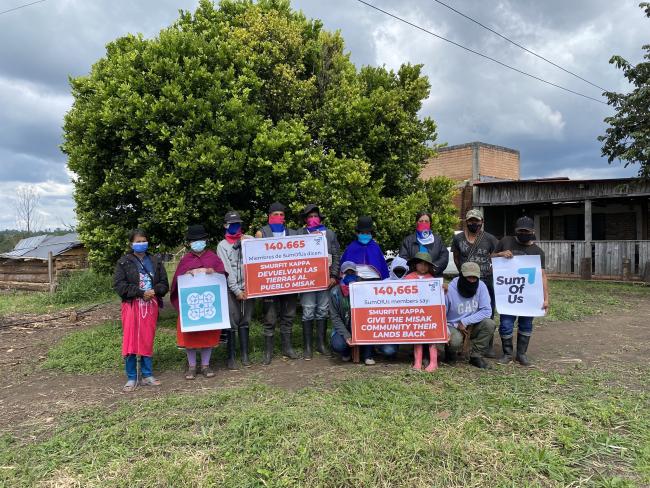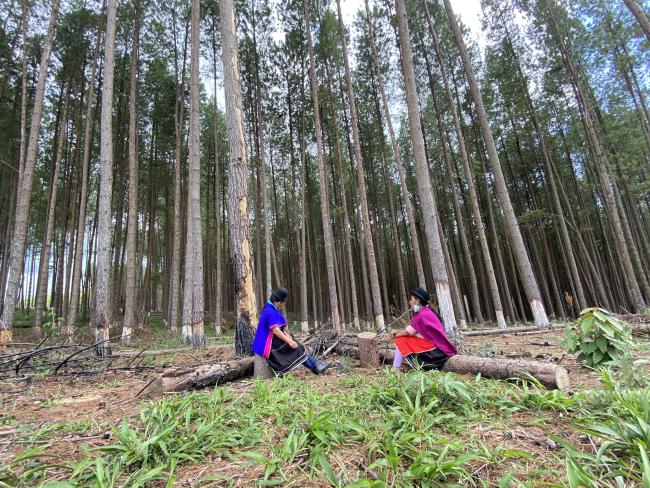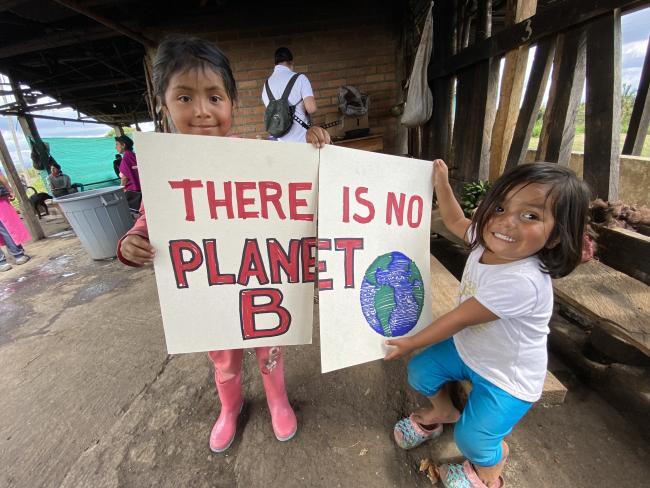
“I have seen how the native forests of my municipality and of my territory disappear, just as the water of the streams and of the rivers diminishes,” says Andrea Sierra, a campesino activist from Colombia’s Cauca region who is identified by a pseudonym due to security concerns. For multinational corporations, she says, “it does not matter if the water runs out, it does not matter if the forest is damaged, it does not matter if the animals have to leave, it does not matter because what matters is profit and wealth.” Sierra is involved in land reclamation efforts against the Irish packaging manufacturer Smurfit Kappa.
A ubiquitous but largely invisible multinational company, Smurfit Kappa produces 11 billion square meters of packaging each year. In a world where everything comes to us wrapped in packaging, chances are that your latest book delivery or the crackers on your kitchen shelf came inside a box produced by the company. The story of how this cardboard empire was built stretches far from our desks and breakfast tables, to the rainforests of Colombia.
Founded in Dublin in 1934, Smurfit Kappa remains headquartered in Ireland and the current CEO is the grandson of founder Jefferson Smurfit. Today, however, much of Smurfit Kappa’s operations are spread across the 36 countries in which the company is active. This includes 68,000 hectares (over 168,000 acres) of monocrop forestry for paper production, the majority of which is situated in Colombia. Smurfit came to own the land in 1986 when the company bought out the Container Corporation of America, along with its assets throughout Latin America. In 2019, the Irish company increased its stake in its main Colombian subsidiary, Cartón de Colombia S.A., to 98 percent.
From the perspective of the Irish multinational, the focus on Colombia makes good business sense. Labor costs are significantly lower in South America, and the climate is well suited to the non-native pine and eucalyptus trees of their plantations. But for local communities the presence of the Irish company has not been a blessing.
Land Defense and Retaliation
Indigenous and campesino leaders have denounced the negative environmental impacts caused by the company’s monocrop forestry, including the disappearance of native forests and the drying up of watercourses. In a country where land ownership is heavily concentrated in the hands of the few—and where competing demands for access to land constituted a root cause of the decades-long armed conflict—Smurfit Kappa’s massive tracts of forestry are seen by some as damaging the social fabric of communities. Beginning in July 2021, Indigenous and campesino organizations began occupying land belonging to Smurfit Kappa near the company’s center of forestry operations in Cajibío, Cauca, demanding that the company return land to the communities that rely on it for food production. Since then, two locals, 23-year-old Huber Samir Camayo and Indigenous leader Juvencio Cerquera, were killed in confrontations with police and masked attackers, and activists claim they have been subjected to threats and targeted attacks.
In March, printed death threats allegedly circulated by the paramilitary organization Autodefensas Gaitanistas targeted activists involved in the land recuperation efforts. Smurfit Kappa denied any connection to these threats, but the occupations and fear of retaliation continue.
Alberth Ochoa, a spokesperson for the campesino rights organization Coordinador Nacional Agrícola (National Agricultural Coordinator), says that Smurfit Kappa’s business model follows a familiar pattern. “Colombian governments have promoted policies that pursue the enrichment of the few or that make the entry of extractive multinationals easier, i.e., mining companies, multinational oil companies, and those related to timber and other products that are not native to this country and that have deepened the rural conflicts that exist in the country."

El Precio de Bala
The economic model Ochoa describes—extractivism—is a process by which economic resources are extracted from peripheral regions and countries, usually in the Global South, in order to maintain the consumption habits of wealthy countries and bolster the profits of multinational corporations. Approximately 40 percent of Colombian territory has been conceded to multinationals for extractive projects. Mining is the archetypal “extractive” activity, but industrial monoculture agroforestry—which organizations such as the World Rainforest Movement are quick to distinguish from “forests”—are an example of the very same processes. In The Extractive Zone, Macarena Gómez-Barris directly links pine and eucalyptus monocultures like those planted by Smurfit Kappa with extractivism and a form of colonialism that displaces native plants, ecosystems, and communities in favor of non-native trees for foreign consumption.
The centrality of extractivism to the Colombian economy is also tied to the country’s violent history. Colombian sociologists Eloísa Berman-Arévalo and Diana Ojeda have demonstrated how paramilitaries used massacres, sexual violence, torture, and forced displacement to expand palm oil plantations and other extractive industries during the country’s 52-year armed conflict. Even after the Peace Accords were signed between the government and the Revolutionary Armed Forces of Colombia (FARC) in 2016, the link between paramilitary violence and an expanding extractive frontier remains far from over. Instead, “the presence of small, supposedly demobilized paramilitary groups protecting the interests of agro-industrial economies goes hand-in-hand with the entrenchment of an agro-capitalist order.”
Colombian journalist América Niño points out that, although there is no significant record of the company using paramilitaries to seize land, “it has benefited from the armed conflict because the land is devalued by the presence of armed groups,” which often leads to families abandoning or selling their land—a phenomenon known as precio de bala, the bullet price.
Accumulation by dispossession was a common tactic used throughout Colombia’s armed conflict. Between 1988 and 1994, the murder, disappearance, and torture of 352 victims in a wave of violence known as the Massacre of Trujillo, also in the Cauca department, was carried out in order to cleanse the local community from their land and make room for paramilitaries and drug traffickers. Other actors also benefited, including Smurfit Kappa. One survivor quoted in a report by Colombia’s National Center for Historical Memory, claimed that, even as drug trafficking has declined, “Smurfit has come and they are the ones who intimidate to plant their pines or eucalyptus trees.”
This displacement feeds into the phenomenon of “depeasantization”—the break-up of traditional Indigenous, campesino, and Afrodescendant economies and social structures—driven by the shift over the previous decades from subsistence farming to mass production of sugarcane, followed by coca during the armed conflict, and most recently monocrop pine and eucalyptus. Community activist Sierra describes how this process has impacted once-autonomous campesino and campesina identities: “This cultural identity is transformed into a worker, a laborer, a wage earner.”

Ireland’s Changing Position in the Global Economy
It is no coincidence that it is the land of Indigenous Misak and Nasa people and local campesinos that is affected by the monoculture forestry operations of Smurfit Kappa, and not communities in the upscale South Dublin district where their head offices are located. In response to a letter from the United Nations calling attention to human rights concerns involving Smurfit Kappa, the company’s press office has denied that their business practices have negatively impacted local communities, emphasizing the educational and social initiatives they’ve carried out in the region. They also “unequivocally reject” any connection with death threats received by activists.
For Niño, however, “we can see the power of an exploiting class that—as in the case of many other multinationals—is located in the Global North. Smurfit Kappa represents just one of many of the multinational companies that exploit us in Latin America, because they believe that our life is worth less than that of those who live or were born in the Global North.” Her analysis echoes Naomi Klein’s description of “sacrifice zones, places that, to their extractors, somehow don’t count and therefore can be poisoned, drained, or otherwise destroyed, for the supposed greater good of economic progress.”
This understanding of how distant regions, populated by non-white people, can boost the bottom line is well understood by Smurfit Kappa. Former CEO Michael Smurfit described his company’s business practices in the same terms as centuries of European colonialism: "The dividends that we have coming back from overseas are more than the profits we make in Ireland ... A healthy overseas base [...] kept Britain going for several hundred years. Spain, Portugal and France developed that way.”
Ironically, part of the “overseas base” that sustained Britain was Ireland. For centuries, Ireland’s people and resources were exploited in the name of British expansion. An Irish businessman celebrating his company’s participation in those same processes is, therefore, indicative of a shift in Ireland’s position in the global economy, in which Irish companies have joined their British, Canadian and U.S. counterparts in the exploitation of the Global South. Since Ireland’s transition from a peripheral resource pool and supplier of cheap labor for Britain, to full member of the European community in 1973, the country’s trajectory has followed the earlier transformation of its diaspora, charted by Noel Ignatiev in How the Irish Became White. Companies like Smurfit Kappa show us that Ireland has become European, with all the concomitant opportunities for exploitation and extraction in the Global South. Indeed, even as Ireland continues to emerge from a decade-long armed conflict in the six Northern counties, an Irish company, through its concentration of agricultural land, continues to threaten peace in Colombia.
By buying a 98 percent stake in Cartón de Colombia, Smurfit Kappa purchased not just a Colombian company, but profit-making potential created through the clear-cutting of native forests and benefiting directly from an armed conflict that drove local communities from their lands. This makes Smurfit Kappa and its investors the latest link in a chain of resource extraction tracing back through decades of violence.
Michael Smurfit’s appreciation of the benefits of a “healthy overseas base” relate not only to increased profits, but also the ability to keep those displaced by the company’s business practices out of sight of consumers and investors at home. Smurfit Kappa trumpets its environmental credentials in their Sustainable Development Reports, but the accounts of recycled packaging are little more than “greenwashing” that invisibilizes the often violent processes that produce so much of what consumers in the West take for granted.
In Colombia, where corporations like Smurfit Kappa have been able to profit from the dispossession of local communities, the ultimate winners of the armed conflict may not be the FARC guerrilleros or right-wing paramilitaries, but businessmen in Dublin boardrooms. Today, the struggle remains far from over.
For Andrea Sierra, the aim of the current campaign of land recuperations is “to recover the possibility for a family—for a woman, a man, children, the elderly—to live in autonomy." She looks forward to a time when “the company moves out of the territory and those lands that are used for paper production become used to produce food.”
Tomás Ó Loingsigh is a journalist and educator based in Ireland, where he has previously worked with Latin American solidarity organizations.

